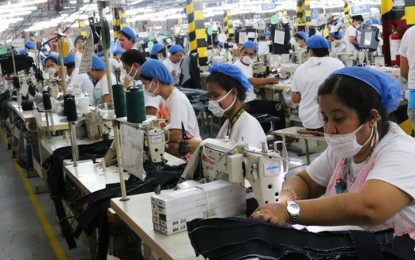
File photo
MANILA – The Philippines' garment industry has taken a big hit from the coronavirus disease (Covid-19) pandemic, cutting exports by almost 40 percent and putting the livelihoods of over 600,000 Filipinos "at-risk", the International Labor Organization (ILO) said Thursday.
In the study titled "Supply chain ripple effect: How Covid-19 is affecting garment workers and factories in Asia and the Pacific", the ILO said total combined imports to the United States, the European Union, and Japan from ten major apparel and footwear producing countries in Asia fell significantly between January and June 2020, when compared to the same period in 2019.
"The largest percentage decreases in exports were observed in China, India, the Philippines, and Sri Lanka," it said.
In the Philippines, exports were cut by almost 40 percent to major buyer countries "putting the livelihoods and employment of more than 600,000 workers at risk," it added.
The research highlights that major buying countries’ imports from garment-exporting countries in Asia dropped by up to 70 percent in the first half of 2020, due to collapsing consumer demand, government lockdown measures, and disruptions to raw material imports necessary for garment production.
As of September 2020, the ILO said almost half of all jobs in garment supply chains were dependent on demand for garments from consumers living in countries with the most stringent lockdown measures in place, where retail sales have plummeted.
“This research highlights the massive impact Covid-19 has had on the garment industry at every level. It is vital that governments, workers, employers and other industry stakeholders work together to navigate these unprecedented conditions and help forge a more human-centered future for the industry," said Chihoko Miyakawa, ILO Regional Director for Asia and the Pacific.
The study also revealed that women, who make up the majority of the workers, have been disproportionately affected by the pandemic, "exacerbating existing inequalities in earnings, workload, occupational segregation, and distribution of unpaid care work".
The ILO underscored the need for continued support for enterprises, as well as the extension of social protection for workers, especially women.
Based on latest ILO data, the Asia-Pacific employs an estimated 65 million garment sector workers in 2019, accounting for 75 percent of all garment workers worldwide. (PR)
